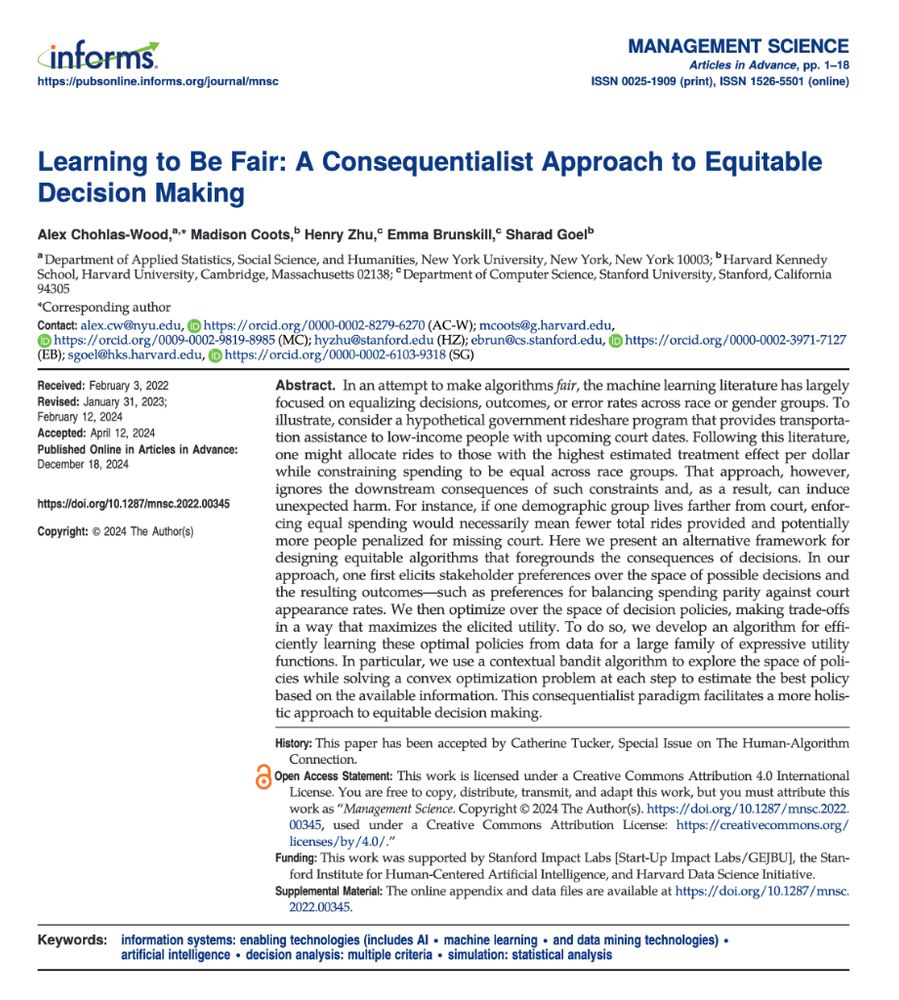
Alex Chohlas-Wood
@alexchohlaswood.com
Assistant professor at NYU interested in computational public policy and the criminal justice system. Co-direct @comppolicylab.bsky.social.📍NYC 🏳️🌈 alexchohlaswood.com
Thanks Nikhil! I have a copy if it’s taken down!
October 30, 2025 at 11:18 PM
Thanks Nikhil! I have a copy if it’s taken down!
Learn more about how you can use 911 data to understand police deployment in our short blog post for ASA's Committee on Law and Justice Statistics:
community.amstat.org/lawandjustic...
community.amstat.org/lawandjustic...
ASA Community
The ASA Community is an online gateway for member collaboration and connection.
community.amstat.org
October 30, 2025 at 2:31 PM
Learn more about how you can use 911 data to understand police deployment in our short blog post for ASA's Committee on Law and Justice Statistics:
community.amstat.org/lawandjustic...
community.amstat.org/lawandjustic...
In a new blog post for the @amstatnews.bsky.social, John Hall and I make novel use of the city's 911 data to show that overnight train patrols more than doubled after the city announced its new policy in January.

October 30, 2025 at 2:31 PM
In a new blog post for the @amstatnews.bsky.social, John Hall and I make novel use of the city's 911 data to show that overnight train patrols more than doubled after the city announced its new policy in January.
But it turns out the information we need is already public, in the city's "Calls for Service"—a.k.a. 911—dataset!

October 30, 2025 at 2:31 PM
But it turns out the information we need is already public, in the city's "Calls for Service"—a.k.a. 911—dataset!
You might think that you'd need detailed police deployment records to answer this question.
Getting this information via a public records request could take months, and may be denied by the department altogether.
Getting this information via a public records request could take months, and may be denied by the department altogether.
October 30, 2025 at 2:31 PM
You might think that you'd need detailed police deployment records to answer this question.
Getting this information via a public records request could take months, and may be denied by the department altogether.
Getting this information via a public records request could take months, and may be denied by the department altogether.
And read more in a great piece from the Mercury News in San Jose (where our study was conducted):
www.mercurynews.com/2025/10/01/s...
www.mercurynews.com/2025/10/01/s...

Study: Text reminders to South Bay public defender clients reduced jail time from court no-shows
Researchers at Stanford, Harvard, NYU piloted automated messaging to Santa Clara County defendants and achieved a 20% drop in bench warrants and pretrial incarceration.
www.mercurynews.com
October 1, 2025 at 6:09 PM
And read more in a great piece from the Mercury News in San Jose (where our study was conducted):
www.mercurynews.com/2025/10/01/s...
www.mercurynews.com/2025/10/01/s...
Learn more about our study in this thread from two years ago:
bsky.app/profile/alex...
bsky.app/profile/alex...
In a new randomized experiment at the Santa Clara County Public Defender Office, my colleagues and I found that text message reminders reduce *incarceration* for missed court dates by over 20%! More in the 🧵 below. alexchohlaswood.com/assets/paper... 1/11
October 1, 2025 at 6:09 PM
Learn more about our study in this thread from two years ago:
bsky.app/profile/alex...
bsky.app/profile/alex...
Reminders alone are unlikely to dramatically reduce overall jail populations, as jail stays for missed court dates are often short.
But stacking them with other small, common-sense reforms could substantially improve our justice system.
But stacking them with other small, common-sense reforms could substantially improve our justice system.
October 1, 2025 at 6:09 PM
Reminders alone are unlikely to dramatically reduce overall jail populations, as jail stays for missed court dates are often short.
But stacking them with other small, common-sense reforms could substantially improve our justice system.
But stacking them with other small, common-sense reforms could substantially improve our justice system.
Reminders also help everyone by saving precious public resources instead of paying for these wasteful jail stays.
The reminders themselves cost about 60¢ per case—less than the costs of paying for someone’s arrest and incarceration, even for a single night.
The reminders themselves cost about 60¢ per case—less than the costs of paying for someone’s arrest and incarceration, even for a single night.
October 1, 2025 at 6:09 PM
Reminders also help everyone by saving precious public resources instead of paying for these wasteful jail stays.
The reminders themselves cost about 60¢ per case—less than the costs of paying for someone’s arrest and incarceration, even for a single night.
The reminders themselves cost about 60¢ per case—less than the costs of paying for someone’s arrest and incarceration, even for a single night.
We found that a broad swath of clients appeared to benefit from reminders—even people facing low-level charges.
Think of a DUI case: make a bad mistake one night, then forget a court date, and suddenly you’re in jail for a few days. A minor case just became much more serious.
Think of a DUI case: make a bad mistake one night, then forget a court date, and suddenly you’re in jail for a few days. A minor case just became much more serious.
October 1, 2025 at 6:09 PM
We found that a broad swath of clients appeared to benefit from reminders—even people facing low-level charges.
Think of a DUI case: make a bad mistake one night, then forget a court date, and suddenly you’re in jail for a few days. A minor case just became much more serious.
Think of a DUI case: make a bad mistake one night, then forget a court date, and suddenly you’re in jail for a few days. A minor case just became much more serious.
Court date reminders may seem small, but they make a big difference.
Our study was conducted with public defender clients who can’t afford a lawyer.
These nudges are a huge boon for low-income clients, helping them avoid the high costs of a disruptive stay in jail.
Our study was conducted with public defender clients who can’t afford a lawyer.
These nudges are a huge boon for low-income clients, helping them avoid the high costs of a disruptive stay in jail.
October 1, 2025 at 6:09 PM
Court date reminders may seem small, but they make a big difference.
Our study was conducted with public defender clients who can’t afford a lawyer.
These nudges are a huge boon for low-income clients, helping them avoid the high costs of a disruptive stay in jail.
Our study was conducted with public defender clients who can’t afford a lawyer.
These nudges are a huge boon for low-income clients, helping them avoid the high costs of a disruptive stay in jail.
Our study has now been peer reviewed—and it's officially out today in Science Advances!
It’s open access, which means it’s free for anyone to read.
www.science.org/doi/epdf/10....
It’s open access, which means it’s free for anyone to read.
www.science.org/doi/epdf/10....
Automated reminders reduce incarceration for missed court dates: Evidence from a text message experiment
You have to enable JavaScript in your browser's settings in order to use the eReader.
www.science.org
October 1, 2025 at 6:09 PM
Our study has now been peer reviewed—and it's officially out today in Science Advances!
It’s open access, which means it’s free for anyone to read.
www.science.org/doi/epdf/10....
It’s open access, which means it’s free for anyone to read.
www.science.org/doi/epdf/10....
(And I'll be teaching a course like this next spring at NYU so I'd love to hear what else you find!)
February 14, 2025 at 12:53 AM
(And I'll be teaching a course like this next spring at NYU so I'd love to hear what else you find!)
And another from Jochen Hartmann here: cms.mgt.tum.de/fileadmin/mg...
cms.mgt.tum.de
February 14, 2025 at 12:52 AM
And another from Jochen Hartmann here: cms.mgt.tum.de/fileadmin/mg...
I came across two courses recently, one from @zjelveh.bsky.social here: zjelveh.github.io/teaching/ins...
Syllabus for INST 798/808: A.I.-Powered Research Assistants
personal description
zjelveh.github.io
February 14, 2025 at 12:52 AM
I came across two courses recently, one from @zjelveh.bsky.social here: zjelveh.github.io/teaching/ins...
Reposted by Alex Chohlas-Wood
Yes to evaluating the *outcomes* of these systems rather than as a standalone algorithm! This is something that's been bothering me for a while about ML assisted decisions
January 9, 2025 at 4:24 PM
Yes to evaluating the *outcomes* of these systems rather than as a standalone algorithm! This is something that's been bothering me for a while about ML assisted decisions
Ultimately, we’ll likely achieve better outcomes if we think of algorithms as *policies* — and design them in a way that aims for the specific policy goals we desire.
(17/17)
bsky.app/profile/alex...
(17/17)
bsky.app/profile/alex...
NEW in Management Science!
My coauthors and I came up with a new consequentialist approach to designing equitable algorithms.
Instead of imposing fairness criteria on an algorithm (like equal false negative rates), we aim for good outcomes.
More in the 🧵 below! (1/)
My coauthors and I came up with a new consequentialist approach to designing equitable algorithms.
Instead of imposing fairness criteria on an algorithm (like equal false negative rates), we aim for good outcomes.
More in the 🧵 below! (1/)

January 8, 2025 at 11:32 PM
Ultimately, we’ll likely achieve better outcomes if we think of algorithms as *policies* — and design them in a way that aims for the specific policy goals we desire.
(17/17)
bsky.app/profile/alex...
(17/17)
bsky.app/profile/alex...

